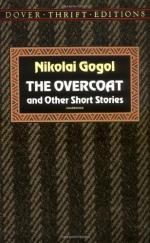|
This section contains 1,886 words (approx. 5 pages at 400 words per page) |

|
In the following excerpt Proffer examines the Symbolist, Formalist and Freudian interpretations of Gogol's short story. He also discusses Gogol's style, deeming him a "verbal gymnast."
[Gogol] is rightly regarded as Russia's foremost verbal gymnast. Tongue-twisting names, rhymes, and puns spring up like clowns. Using metaphor and metonymy to turn people into toe-nails or noses, he works more transformations than a drunken Roman mythologist. His prose is poetic and onomatopoetic— rhetorical figures abound, rhythmic and phonetic considerations help determine each phrase. Pushkin's favorite punctuation is the period. Gogol's is the semicolon; and at first glance, the profusion of dependent clauses and qualifications may bring to mind a fishing reel's backlash. Many of Gogol's old-fashioned contemporaries considered him a vulgarian, both because of his inelegant subject matter and the "non-literary" vocabulary which he introduced (colloquialisms, bureaucratese, dialectisms, jargon, and neologisms); but with time his lexical salmagundi, syntactical...
|
This section contains 1,886 words (approx. 5 pages at 400 words per page) |

|




